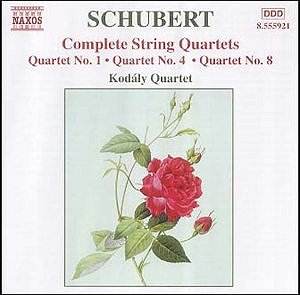Not having ever heard the first and fourth of Schubertís fifteen
string quartets it was a great pleasure to find them both on this Vol.4
release from Naxos of Schubertís complete string quartets. The three quartets
featured on this recording are very early works; two of which were composed
when Schubert was a schoolboy. Chamber music was an integral part of the
young Schubertís life and it is little surprise that he should become
so skilled in this area. As a boy Schubert was both a pianist and a viola
player who formed part of the family quartet together with his cello playing
father and his two elder brothers who played the violin.
In spite of Schubertís youth at the time of their composition
these are clearly very accomplished chamber works and eminently treasurable.
The influence of the great chamber works by Schubertís predecessors
Haydn, Mozart and his older contemporary Beethoven is apparent together
with a preview of the emotional turmoil which is so characteristic of
his mature compositions.
Music writer David Ewan feels that Schubert was influenced
most of all by Beethoven. "The deepening of the poetic content
in his music, and the seeking out of new ways to extend musicís expressiveness,
motivated Schubert from his very beginnings. One of the reasons why
his structure and modulation are so clumsy in the early years was because
he was trying to emulate Beethoven without possessing the necessary
know-how."
Clearly with these three early quartets the youthful
Schubert was still learning his trade. The earliest quartet the D.18
is an uneven composition in many respects particularly in its choice
of keys. The first movement Andante ma non troppo is wonderfully
played by the Kodaly and the very fine Menuetto leaves the listener
wanting more. It is worth noting that the timing in the booklet notes
incorrectly states the fourth movement Presto as 9:12 instead
of 4:09. In the C major D.46 quartet we can see the evidence of Schubertís
developing confidence and growing individuality. Particularly impressive
is the splendid interpretation of the rather unsettling and agitated
opening movement Allegro con moto which follows the short adagio.
The later B-flat major quartet D.112 which is said to have been composed
in only eight days, arguably has too little variety in the form but
is full of youthful exuberance and marks a new advance for Schubert
as a composer. The Mozartian second movement Andante sostenuto is
extremely lyrical and beautiful. The Kodalyís sympathetic and restrained
playing in the Andante sostenuto is perhaps the highlight of
the whole quartet and their courtly and elegant playing in the third
movement Menuetto also deserves praise.
As demonstrated so admirably on this release the predominant
feature of Schubertís music was always melody. David Ewan considers
Schubert to be the greatest melodist of all time stating that, "he
could mould lyricism at will for every possible emotion or effect Ö
In symphonies, sonatas, and quartets he could compound one beautiful
melody on another with the most incredible profusion."
The Kodaly Quartet play with exemplary precision across
all the three quartets in a persuasive manner that is extremely consistent.
They display an assured affinity for this repertoire and their engaging
performances will not disappoint any listener. These are energetic and
vigorous accounts of the quartets but never volatile and undisciplined.
There is much to admire here as the foursome integrate
perfectly as a team. Their playing is full bodied and vigorous when
necessary, with a restrained sensitivity without any temptation to wear
their hearts on their sleeves in Schubertís expressive and poetic passages.
The Kodaly provide a very appealing, even handsome, sound that shows
respect for the music without any hint of being sugary or too delicate
as if they were handling a fragile porcelain figurine.
I have heard the previous three volumes of this Naxos
series of the Schubert quartets and this is by far the superior. There
is a truthful and fresh sound to this well-balanced recording when combined
with such fine performances as these makes this release eminently recommendable.
Michael Cookson


